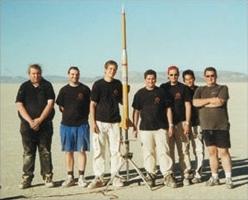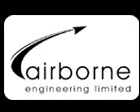2003 Launch Program
Members of the MARS rocket team will fly out to Reno and then head for the small town of Gerlach in the Black Rock Desert of Nevada on Monday 15th September where they will have five days in which to complete the flight program. It is on these same flat sands back in 1997 that the Thrust SSC team set the land speed record and this year the MARS team hopes to successfully complete two launches.
The first is a re-launch of last years Deimos Odyssey rocket with a refined
injection system and new nozzle design. It is hoped that with these
improvements the rocket will break the existing European altitude record.

The second launch will be a two-stage sounding rocket, which will be launched at an angle of ten degrees off vertical in order to simulate the launch environment that will be experienced at one of our proposed space launch sites next year. This launch, as happened last year, will only take place if the first is successful and time permits. One of the main issues MARS is hoping to resolve with this rocket is the second stage deployment, which is undertaken whilst travelling at around 1000 mph. This then releases the upper section allowing it to accelerate away and increase its speed to just over Mach 2.
Both rockets carry an impressive array of avionics, which are a minimum of 3 flight computers, an engine management system, 3 altimeters, an onboard GPS tracking system, a video and data telemetry system and a number of onboard video cameras and stills cameras for remote sensing.
All of this information is transmitted back live to the teams ground station and fed directly into several computer systems for immediate analysis of the data. This allows the team to know exactly what is happening to the rocket at all times and also gives them two locations in which the data is stored, the other being on the rocket itself. On top of all of this is the mobile tracking station is also in permanent contact with the rocket ensuring that the team is able to recover the vehicle as quickly as possible.
Once the rocket is recovered all of the onboard data is downloaded for analysis; it is by this means that we are able to confirm everything achieved by the rocket.
Wednesday 17th and Thursday 18th have been set aside for the preparation of the rockets. This leaves the team with three days in which to complete their two launches. Due to the time delay the earliest one can expect to know any result from the first launch would be around 22:00 BST on Friday 20th September. The media web site will be updated continuously over the week so you will be able to follow the launches as they happen and a full update will be sent out on the following Monday morning.
Continue to the 2004 Schedule - Deimos 3 >>>










